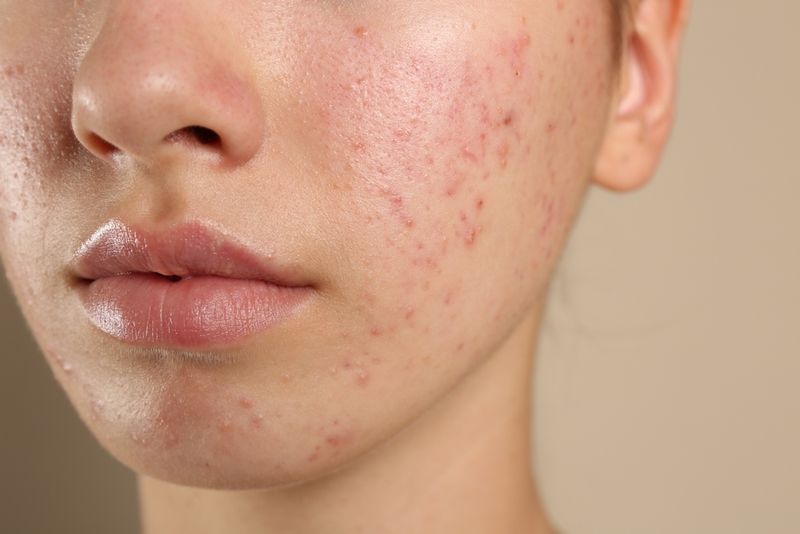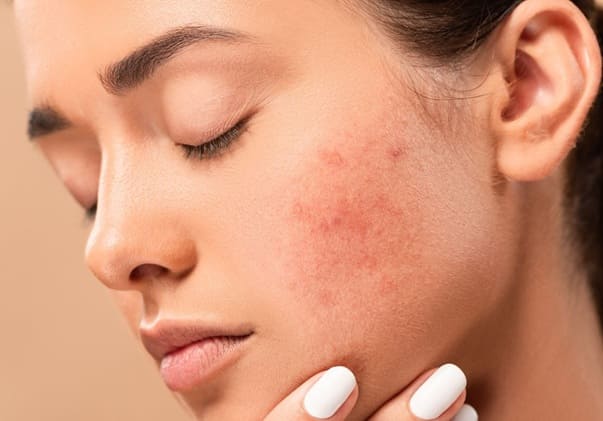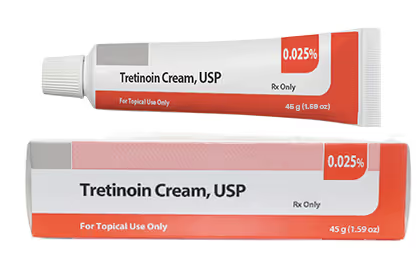Key Takeaways
- Spironolactone is a prescription medication that’s effective at treating hormonal acne, specifically in women.
- The drug minimizes the impact of testosterone, a hormone that plays a crucial role in acne formation.
- Spironolactone comes with side effects. If any of them get severe, you should contact your doctor.
- You must take spironolactone every day for it to work. It can sometimes take 3 to 6 months before you learn whether or not the medication works for you.
If you’ve done a deep dive into how to treat certain types of acne, you have likely encountered the name spironolactone. This type of medication is used to treat a wide range of conditions.
But is it effective at treating acne? And what do you need to know about the medicine before trying in it? In this guide, we’ll review everything you need about spironolactone. That way, you can decide for yourself if it’s something you want to discuss with your dermatologist.
What is Spironolactone?
Spironolactone is a prescription medication that’s used to treat a variety of different conditions. These conditions include hyperaldosteronism, heart disease or failure, hypertension, low potassium, and edema.
However, it has another benefit: treating hormonal acne in women.
Is it Safe?
If you’re a healthy woman, then spironolactone has been deemed safe to take and has FDA approval. However, you should not take spironolactone if you are a male. Why? Because it lowers the effectiveness of testosterone.
If males take Spironolactone, one side effect is the possibility of developing more prominent breasts, known as gynecomastia.
Spironolactone should not be taken during pregnancy. If you get pregnant while on spironolactone, it can cause congenital disabilities in your child.
Does Spironolactone Actually Help Acne?
Spironolactone does help acne in women. Acne is caused by excess oil production often triggered by hormones, which leads to clogged follicles, bacteria buildup, and inflammation.
When your body produces more testosterone, it can also increase your sebum production. This can lead to hormonal acne. But when you take spironolactone, it decreases the effects of testosterone on your body. As such, your skin produces less sebum, which leads to less acne.
What Does Spironolactone Do to Female Hormones?
We’ve mentioned that spironolactone lessens the effect of male hormones like testosterone. But what about female hormones like estrogen?
So far, there are no studies showing that spironolactone affects estrogen negatively. So you don’t need to worry about female hormones becoming less effective.

How Quickly Does Spironolactone Work for Acne?
It will likely take some time before you can see the effects of spironolactone. For most people, it will take between three to six months before results can be seen.
While it takes some time to kick in, Spironolactone is often preferred by dermatologists as a long-term treatment option over antibiotics, which are meant for short-term use.
Related: Why Us – Clearing Acne Is What We Do
What Are the Major Side Effects of Spironolactone?
Since this medication is used to treat other conditions, it comes with many potential side effects. Things you may encounter include:
- Dizziness, drowsiness, headaches, and lethargy
- Irregular menses ( more common)
- Breast pain (more common)
- Urinary Frequency
- Alopecia
- Chloasma
- Erythematous maculopapular rash pruritus
- Stevens-Johnson syndrome
- Toxic epidermal necrolysis
- Urticaria
- Amenorrhea
- Asymptomatic hyperuricemia
- Ataxia
- Decreased libido
- Electrolyte disorder
- Gout
- Hyperglycemia, hyperkalemia, hyperuricemia, hypocalcemia, hypomagnesemia, hyponatremia and hypovolemia
- Abdominal cramps
- Gastritis, gastrointestinal bleeding, and gastrointestinal ulcer
- Nausea, vomiting, and diarrhea
- Postmenopausal bleeding
- Agranulocytosis
- Leukopenia
- Thrombocytopenia
- Hepatotoxicity
- Anaphylaxis
- Lower limb cramp
- Renal failure syndrome
- Renal insufficiency
- Fever
- Metabolic acidosis
- Vasculitis
Most of these side effects will be temporary and minor. However, if any of the things we covered above become severe, contact your doctor immediately.
Does Spironolactone for Acne Make You Gain Weight?
Some people worry that the spironolactone they’re taking is causing them to gain weight. However, it’s vital to note that weight gain is not listed as a side effect on the packaging for spironolactone. If you’re gaining weight, it’s likely due to another factor.
What’s Involved in Spironolactone Treatment?
Your first step in taking spironolactone is contacting your dermatologist. During your appointment, they’ll examine your acne to see if it’s hormonal. You can also expect them to ask questions about any medical conditions you have, medication you’re taking, and surgeries you may have had in the past.
You may need to get both your blood and blood pressure tested before getting spironolactone. Spironolactone requires you to gradually increase the dose over time.
So you must meet with your dermatologist every four weeks for updates. If you have any questions about getting prescribed this type of medication, explore our FAQs.
Points to Consider Before Taking Spironolactone
As we mentioned before, spironolactone doesn’t work for everyone. 75% of women experience positive results; the effectiveness of spironolactone can also vary.
Some women experience a complete clearing of acne. Others might only notice a reduced rate. Most people will see results in three months, but it can take up to half a year.
Want to save money when taking spironolactone? Check out our pricing guide to learn how you can save with Honeydew.
How to Get the Best Results
The first way to get the best results from spironolactone is to stick with it. It can take a long time for the drug to work, so patience is key.
Make sure that you take the medication at the same time every day.
Additionally, spironolactone works well in conjunction with other acne treatments, so consider a multi-therapy approach.
Lastly, make sure to provide regular updates to your dermatologist.

Spironolactone for Acne
There is good evidence that spironolactone can help treat hormonal acne in females. Luckily, services like Honeydew can save you both time and money in getting the acne treatments you need. If you’re interested, this page will get you started.























